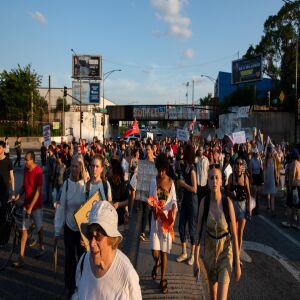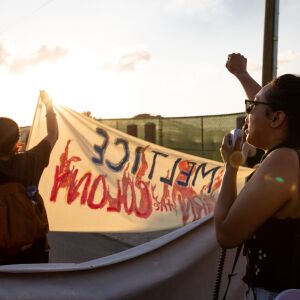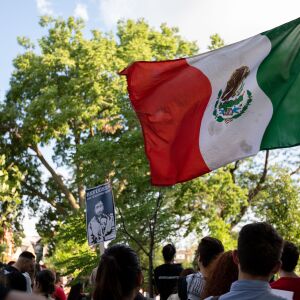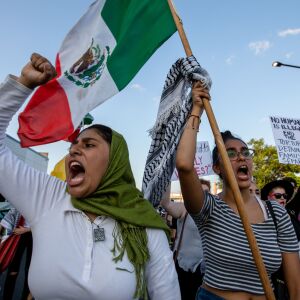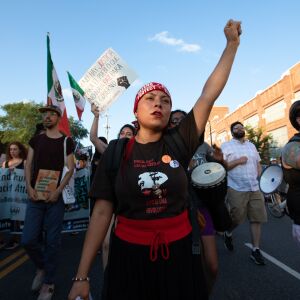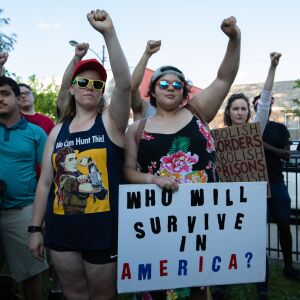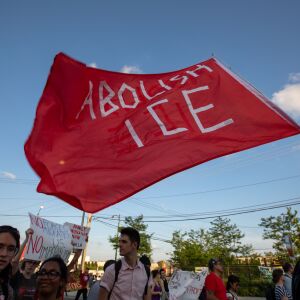A movement to ax the federal agency entrusted with enforcing immigration law is brewing across the country. And this weekend, it’s making its way onto Chicago streets.
On Friday evening, over 200 people led by a multiracial coalition of more than a dozen Chicago activist and community groups marched through Pilsen and Little Village to demand the abolishment of U.S. Immigration and Customs Enforcement, or ICE. Supporters will also march in Saturday’s “Families Belong Together” rally in the Loop.
Protesters differ on what “abolishing” ICE means. Some see it as a stand-in for creating a more humane immigration system. Others see the movement as a way to demand an end to deportations altogether.
But abolitionists agree that the status quo is unacceptable.
“We are calling on the abolition of ICE as a fundamental step towards protecting the human rights of our immigrant families and demanding of our public representatives across the nation have a serious conversation about comprehensive immigration reform,” organizers of Friday’s march said in a statement.
ICE was formed in 2003 as part of the Department of Homeland Security. Since then, its annual budget has ballooned from $3.3 billion to $6.1 billion in 2016, employing 20,000 people at 400 field offices. It detains at least 100,000 people annually and, as recently reported in The New Yorker, makes “more arrests per year than the F.B.I., the U.S. Marshals, and the Secret Service make combined.”
Civil rights groups have accused ICE agents of physically and sexually abusing immigrants in custody. The agency’s tactics of arresting people at schools, hospitals, and churches have enraged many.
Critics worry that under the Trump administration, ICE has its sights on deporting as many unauthorized immigrants as possible. Soon after Trump took office, ICE arrests surged by 40 percent, while the number of immigrants arrested with a clean criminal record nearly doubled. Last year, acting ICE director Thomas Homan warned that all unauthorized immigrants “should look over [their] shoulder” and “need to be worried.”
For Zuneera Masood Johnwell, a third-year student at the John Marshall Law School and head of the school’s Muslim Law Student Council who attended Friday’s march, Homan’s threat is a reason she wants ICE abolished.
“I do believe this country does not need ICE. Deportations — especially the way deportations are conducted today — are completely antithetical to what America should be,” she said.
Abolitionists could add a new friend in Congress. In a primary race Tuesday, Alexandria Ocasio-Cortez, a 28-year-old Puerto Rican Democratic-socialist from the Bronx who campaigned on abolishing ICE, unseated Joe Crowley, a 10-term Democratic powerhouse.
A few days later, Sen. Kirsten Gillibrand, D-NY, also threw her support behind the movement.
“[ICE] has become a deportation force,” Gillibrand tweeted on Thursday. “We need to separate immigration issues from criminal justice. We need to abolish ICE, start over and build something that actually works.”
Still, the movement is far from gaining enough support to push through any national legislation. But Chicago protesters say their main task is to limit ICE’s reach in the city.
“Abolishing ICE in Chicago means abolishing all of our city’s ties with ICE,” Ald. Carlos Ramirez-Rosa (35th) said at Friday’s march.
For Ramirez-Rosa, that means amending Chicago’s “Welcoming City” ordinance and ending the Chicago Police Department’s relationship with ICE. He also wants the City Council to end the so-called “gang database” CPD shares with ICE that holds the names of up to 195,000 Chicagoans — predominantly black and Latinos — who police suspect of being in a gang.
“It’s one thing for Chicago politicians to say ‘ICE is bad,’ ” Ramirez-Rosa said. “What we need to do is lead by example and make Chicago truly a welcoming city for all immigrants.”





















